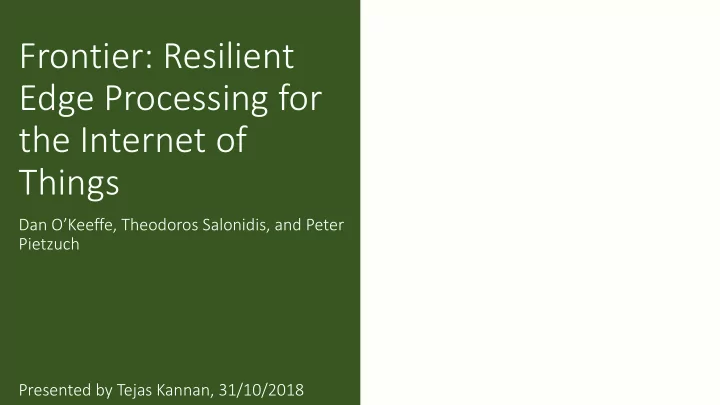

Frontier: Resilient Edge Processing for the Internet of Things Dan O’Keeffe, Theodoros Salonidis, and Peter Pietzuch Presented by Tejas Kannan, 31/10/2018
Motivation IoT systems often offload stream computation to the cloud Edge Device Measurement Data Edge Device Edge Device 2
Motivation Increased CPU and memory capabilities of modern devices enables processing to occur without offloading to the cloud Edge Device Measurement Data Edge Device Edge Device 3
Requirements of an Edge Deployment Model Requir irement Frontier’s Solution Continuously process streaming data Move computation to edge devices Data-parallel processing Replicate data operators Adapt to changing network conditions Backpressure Stream Routing (BSR) Recover from transient network failures Selective Network Aware rePlay (SNAP) 4
Stream Query Computational Model Queries can be represented by a directed graph where vertices are operations and edges are streams S 1 S 2 S 3 O source O 1 O 2 O sink 5
Frontier’s Replicated Dataflow Graph Each replica can be placed on a different edge device to enable better data parallelism O 1 O 2 O 1,0 O 2,0 O source O sink O 1,1 O 2,1 6
Properties of Stream Query Routing 1. Window-Based: Operators may act on windows of streams 2. Out-of-order: Processing must be able to cope with out-of-order delivery to maintain high throughput 3. Multi-Input: Operators may accept multiple input streams, so windows from input streams must be sent to same replica 4. Batched Windows: Stream windows may be batched to reduce network communication 7
Backpressure Stream Routing Backpressure routing enables adaptability to network conditions Queue Rate: q i Network Rate: r ij Processing Rate: p j Queue Rate: q j o i d j Outgoing Queue Network Link Outgoing Queue Weight of link is w ij = max(0, ( q i - q j ) x r ij x p j ) Downstream replica with highest weight is chosen 8
Backpressure Stream Routing To coordinate windows for multi-input operators, routing is based on aggregate weights over all destination replicas O src O 1 w agg [O 1,0 ] > w agg [O 1,1 ] O src,0 O 1,0 O src,1 O 1,1 Routing constraints are used to handle out of order arrival 9
Selective Network-Aware Replay (SNAP) Batches are buffered by senders and re-sent upon discovery of a single failed node b 1 O 1 O 2 O 1,0 O 2,0 O snk O src O 1,1 O 2,1 b 2 Diagram from [4] 10
Selective Network-Aware Replay (SNAP) Batches are buffered by senders and re-sent upon discovery of a single failed node b 1 O 1 O 2 O 1,0 O 2,0 O snk O src O 1,1 O 2,1 b 1 b 2 Diagram from [4] 11
Selective Network-Aware Replay (SNAP) Heartbeat messages indicate which batches have been sent downstream, batches not replayed if heartbeats continue to be sent b 1 b 1 O 1 O 2 O 1,0 O 2,0 O snk O src O 1,1 O 2,1 b 2 Diagram from [4] 12
Experimental Setup • Experiments run on a wireless network of Raspberry Pi’s • Two different networks created: high and low diversity • CORE/EMANE [3] wireless network emulator also used High-diversity Mesh Network • Three different queries: Distributed Face Recognition, Video Correlation, Heatmap of Users in Area 13
Experiments: Throughput Varying Replication Factor BSR Compared to Baselines Varying Replication Factor and Batch Size BSR Path Diversity with Different Replication 14
Experiments: Latency Latency with Varying Replication Factor Latency of BSR Compared to Baselines (Error bars show 5/25/50/75/95 percentiles) 15
Experiments: Recovering from Failure Larger replication factors generally lead to higher throughput in the face of failure Distributed Face Recognition Video Correlation Heatmap 16
Experiments: Frontier vs. Apache Flink Frontier generally exhibits a higher throughput than that of other stream processing systems Frontier vs Flink [1] and Round Robin on Face Recognition Query 17
Critique • Method of computing aggregate BSR weights is never explained • Experimentation is robust but minimal comparison of Frontier to other platforms • Possible area of future work: making BSR predictive of network conditions could ease tension between using larger batches and updating network parameters 18
Related Work Platform Name Description How Frontier is Different Cluster-based, structures computation Spark Streaming assumes wired Spark Streaming [7] as stateless batch computations connections between nodes SBON does not replicate Manages operator placement to SBON [5] operators and use backpressure efficiently use network resources to load balance on these replicas Stream processing for IoT systems which CSA does not distribute CSA [6] relies on single nodes on network edge computation across devices 19
Conclusion • Frontier is a stream evaluation platform which performs computation on edge devices • Achieves data-level parallelism by replicating operators and distributing execution across devices • Uses network-aware routing to efficiently use resources in wireless settings • Recovers from transient errors without causing network congestion 20
References [1] Apache flink. https://flink.apache.org/. [2] Apache storm. https://storm.apache.org/. [3] Jeff Ahrenholz. Comparison of core network emulation platforms. In Military Communications Conference, 2010-MILCOM 2010 , pages 166 – 171. IEEE, 2010. [4] Dan O’Keeffe, Theodoros Salonidis, and Peter Pietzuch. Frontier: resilient edge processing for the internet of things. Proceedings of the VLDB Endowment , 11(10):1178 – 1191, 2018. [5] Peter Pietzuch, Jonathan Ledlie, Jeffrey Shneidman, Mema Roussopoulos, Matt Welsh, and Margo Seltzer. Network-aware operator placement for stream-processing systems. In Data Engineering , 2006. ICDE’06. IEEE, 2006. [6] Zhitao Shen, Vikram Kumaran, Michael J Franklin, Sailesh Krishnamurthy, Amit Bhat, Madhu Kumar,Robert Lerche, and Kim Macpherson. Csa: Streaming engine for internet of things. IEEE Data Eng.Bull. , 38(4):39 – 50, 2015. [7] Matei Zaharia, Tathagata Das, Haoyuan Li, Timothy Hunter, Scott Shenker, and Ion Stoica. Discretized streams: Fault-tolerant streaming computation at scale. In Proceedings of the Twenty- Fourth ACM Symposium on Operating Systems Principles , pages 423 – 438. ACM, 2013. 21
Recommend
More recommend